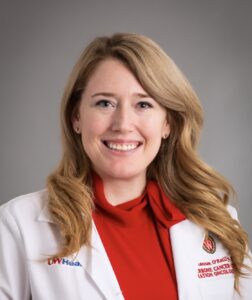2025 Awardees
Title: Improving Breast Cancer Diagnoses in India using Optoacoustic Imaging
Principal Investigator: Dr. Mark Pagel
This is an accordion element with a series of buttons that open and close related content panels.
Abstract: Improving Breast Cancer Diagnoses in India using Optoacoustic Imaging
Breast cancer is the most common cancer among women in India. While mammography is used to identify suspicious breast lesions, mammography has poor diagnostic specificity for differentiating between a malignant cancer, a benign lesion, or fibroadenoma. MRI is often used in the USA to improve diagnostic specificity, but MRI is much less common in India. This problem leads to high mortality from breast cancer in India and in other low-to-middle income countries.
To address this problem, we propose to use Optoacoustic Imaging (OAI), a new imaging modality for breast cancer screening. Oxygen Sensitive (OS) OAI is FDA-approved for breast imaging in the USA. This method can evaluate oxygenation in a suspicious lesion, which can improve the differentiation between a malignant tumor that is hypoxic vs. benign lesions and fibroadenomas that are normoxic.
Dr. Marty Pagel at UW-Madison has developed Dynamic Contrast Enhanced (DCE) OAI that can evaluate vascular perfusion in breast lesions. This method can differentiate between malignant tumors that have immature, “leaky” vasculature vs. benign lesions and fibroadenomas that have normal vasculature. We have developed a combination OS-DCE OAI protocol for pre-clinical studies of orthotopic models of breast cancer. We are translating our OS-DCE OAI methodology to the WIMR Imaging Research Center.
We propose to transfer pre-clinical OS-DCE OAI from UW-Madison to the Indian Institute of Science (IISC) in Bangalore, India. Dr. Sinharay will visit UW-Madison to learn pre-clinical OS-DCE OAI, and Dr. Pagel will visit IISC to provide training for this molecular imaging method. This transfer will provide Dr. Sinharay with the opportunity to develop her new, hydrophilic OAI contrast agents that will improve the measurements of vascular perfusion made with DCE OAI, which will validate Dr. Sinharay as an expert with OS-DCE OAI in India.
We propose to develop relationships and funding plans that lead to the transfer of clinical OS-OAI from UWMadison to India for breast cancer screening. During Dr. Sinharay’s visit UW-Madison, she will also learn clinical OS-DCE OAI. Dr. Pagel will visit IISC and join Dr. Sinharay at the Adyar Cancer Research Institute, Chennai, Tamil Nadu; Christian Medical College, Vellore, Tamil Nadu; and Manipal Hospital, Bangalore, Karnataka, to develop long-term relationships with breast radiologists and breast oncologists in India. The results from Dr. Pagel’s clinical OAI studies at UW-Madison will be used to spur interest in obtaining clinical OAI instruments and performing clinical OAI studies in India to improve breast cancer diagnoses.
Title: Bridging Health Policy, Prevention and Cancer Care Access in Ghana through Education
Principal Investigator: Shannon O’Reilly

This is an accordion element with a series of buttons that open and close related content panels.
Abstract: Bridging Health Policy, Prevention and Cancer Care Access in Ghana through Education
Patients in low- and-middle-income countries (LMICs) often present with later stage disease leading to poorer outcomes and increased mortality rates due to lack of resources in the areas of prevention and early detection. Public education resources to ensure community edification is key to improving cancer care and in order to properly disseminate such information there needs to be multisectoral partnerships and community involvement. In Ghana, cervical cancer is the second most prevalent cancer in women and most present with late-stage disease. The overall goal of the project is to develop public education resources to improve community awareness in the areas of cancer prevention, Human Papillomavirus (HPV) vaccination and early detection for cervical cancer and to identify ideal avenues of distribution of said materials.
In order to achieve this goal, we aim to: Analyze barriers to cancer care access in low-resource settings and determine best practices for disseminating information as well as discern the most useful forms of communication (i.e. videos, web platform, flyers) for given audiences. This information gathering will include field visits to rural clinics, outreach organizations and interactions with traditional healers and community health professionals. We also plan to engage with policymakers to examine the impact of health policy on cancer prevention and screening. Our approach will involve community-engaged exploratory research methodology through in-depth interviews and focus groups.
Effective and culturally resonant health communication strategies through trusted entities are critical to improving prevention efforts. We believe building this communication infrastructure can be used for future cancer initiatives (e.g. breast cancer screening awareness) building sustained collaboration in the region and potential for similar initiatives in other resource limited settings using the established framework.
2024 Awardees
This section will be updated soon
